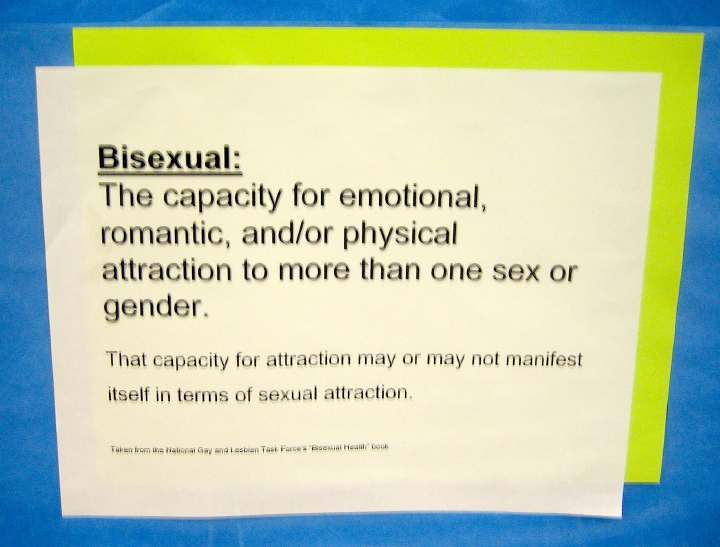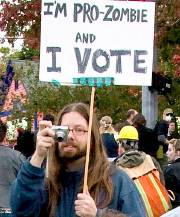Archive for April 2009
On a recent visit to Berkeley last Saturday, I ran into the Dalai Lama quite by accident:
I noticed that a street had been cordoned off and I saw a huge crowd down the block straining to catch a glimpse of something. Out of curiosity, I came closer just in time to see the Dalai Lama arrive in a limousine and bless the crowd before heading into the back door of the Berkeley Community Theater to give a speech. To mark the occasion, the city of Berkeley was flying Tibetan flags on city-owned flag poles at Civic Center Park.
For some reason I was struck by the memory of a different world leader who came to Berkeley nearly nine years ago to give a speech in the exact same theater — but who was given a rather different kind of reception: When Benjamin Netanyahu arrived to give a speech at the Berkeley Community Theater in 2000, the protests were so violent that the speech had to be cancelled at the last minute.
Which got me to thinking: The average Berkeley resident is pro-Tibet, yet anti-Israel. But how logical is that?
Consider the following: Which side do you support in this scenario:
A large empire controlled by a dominant ethnic group tries to seize a comparatively small piece of territory that is the ancestral homeland of a minority ethnic group.
Now, being Americans, our natural urge is to root for the underdog. But the scenario outlined above could apply equally to Tibet or Israel. The only difference is how the story ended up.
The modern nation of China is the contemporary name for the vast empire of the Han Chinese ethnic group. Tibet had been mostly independent for the past two millennia, with occasional periods of domination by the Han. In 1913 Tibet officially declared itself a modern independent nation, and stayed that way until 1950, when a newly re-unified China invaded, seized total control of Tibet, and absorbed it inside the Chinese borders. The Chinese government in the intervening 60 years has encouraged massive migration of millions of Han Chinese into the region, to dilute the power of influence of the vastly outnumbered ethnic Tibetans.
The story of Israel, which in specifics seems totally different on the surface from the history of Tibet, in fact has many fundamental parallels. The ancient nation of Israel had been independent for many centuries, with periods of domination by the Romans and others. Some time after Rome fell, Arabs from the Arabian Peninsula, newly unified under Islam, spread out across the Middle East, central Asia, north Africa and parts of Europe to create a vast Arab empire. The land of Israel was one of the many former nations absorbed into the Arab empire. After a long history far too complicated to summarize in a sentence, the Arab empire eventually fractured into dozens of modern independent nations, all of which still have Arabic as their primary language and Islam as their primary religion. After this fracturing, a minority ethnic group, the Jews, returned to their ancestral homeland in 1948 and declared themselves to be an independent nation. Now, there are many pan-Arab transnationalists who want to re-establish the Arab empire under a caliphate, and that would include abolishing national boundaries, including the one separating Israel from the surrounding Arab world.
In both cases, a large ethnic majority (Han, Arab) wants to subsume the land and national identity of an ethnic and religious minority (Tibetans, Jews) who have a legitimate historical claim for independence. The main difference is how things currently stand: The Tibetans’ homeland has been successfully invaded, conquered and partly ethnically cleansed by the Han; but the Jews have been able (so far at least) to defend their homeland of Israel from invasion and ethnic cleansing by the modern Arabs.
And it is this success at clinging to their independence that is apparently the Jews’ main moral flaw in the eyes of Berkeley. Oppressed people who remain victims deserve our sympathy; but oppressed people who fight back and reclaim their sovereignty are no longer pitiable, and lose their underdog status.
Hence when the former leader of one ethnic group (the Tibetans) arrives in Berkeley he is greeted by cheering crowds like this. But when the former leader of the parallel ethnic group (the Israelis) arrives in Berkeley, he is greeted by riots and threats of violence. The inconsistency is breathtaking.
But what, you may ask, about the Palestinians? How do they fit into this equation? Well, remember that the word “Palestinian” was until 1964 simply an adjective, the first half of the phrase “Palestinian Arab”; it was only with the rise of Yasser Arafat and the Palestinian nationalism that the separate ethnic identity of “Palestinians” was invented. I need not go into the well-trod history of the Near East between 1917 and 1967, when the struggles between the Ottomans, British, French, Arabs, Jordanians, Egyptians and Israelis left those Arabs who had been living in the area around Jerusalem and who had fled in 1948 as the only population without a nation to call their own. The revisionists are trying to claim that the land now called Israel is their ancestral home, and that they thereby have a right to it in its entirety; but from an outside strictly historical point of view, the Jews have a prior claim on the land by about 2,000 years, and the Arabs who later settled there are similar to the Han Chinese who are currently settling in Tibet: subsequent immigrants. Just because someone tried to change the ethnic labels doesn’t mean that the Palestinian Arabs are suddenly native to the region: They remain Arabs, and are being used by the larger Arab world as a tool to re-establish an Arab empire.
I realize that I’m not going to settle any arguments with this post, but I ask: What is your view of the parallels between Tibet and Israel? Do you accept my basic historical framework? Is it logically and morally consistent to support the independence of Tibet and Israel? Or do you reject this paradigm, and adopt some alternate historical structure, as do apparently most of the residents of Berkeley?
Spotted recently at a trendy fashion boutique in San Francisco:
When a different store in San Francisco (a novelty gag store) stocked the same candles (which feature Obama’s head on St. Martin de Porres’ body), the local Catholic priest called for a boycott of the store. I can’t decide which is more amusing: San Francisco’s non-religious hipsters worshipping Obama like a holy saint — or a priest actually thinking such worship is blasphemous.
The same boutique also featured these Obama T-shirts with an Arabic slogan above his face. Anybody able to translate it?
A while ago I happened across an exhibit on bisexuality put up by the “Gender Equity Resource Center” on the U.C. Berkeley campus.
One of the signs (sorry for the blurry photo) said, “Bisexual: The capacity for emotional, romantic and/or physical attraction to more than one sex or gender. That capacity for attraction may or may not manifest itself in terms of sexual attraction.” This contradicts the standard definition of bisexuality, “sexual behavior with or physical attraction to people of both genders (male and female), or a bisexual orientation.” The question is: Why intentionally broaden the definition to include “the capacity” for attraction, which would include just about everybody?
The sign got me to thinking: Is there really a “gay agenda” in modern academia? It does seem at times that the message “Everyone’s gay; you’re gay too, even if you don’t realize it yet” is pretty omnipresent in certain departments.
This sign (which is more than just a sign — it represents the philosophy of the “Gender Equity Resource Center,” and was taken from “The National Gay and Lesbian Task Force’s Bisexual Health book”) is a new twist on the concept: OK, maybe you’re not all gay, but you are all bi. The key word in the sign is “capacity”: In order to be classified as bisexual, all you need to have is the capacity for any sort of emotional connection with people of more than one gender. And really, everybody has the capacity for anything, even if it isn’t expressed — right? Q.E.D., everyone is bisexual. Whether or not they know it.
Is there now jockeying within the politico-sexual academic world for control over the right to dictate humanity’s sexual orientation?
What if I made my own sign:
“Heavyweight Boxing Champion: Anyone with the capacity to train really hard and then become so good at boxing that they could win a championship match. That capacity for victory may or may not manifest itself in terms of actually winning a match.”
Anyway, the bisexuality sign got me to thinking, and I’m still thinking about it, though perhaps not in the way the designers intended. I haven’t reached a conclusion yet. What’s your opinion?




 (Note: This is not a photo of me, but rather
(Note: This is not a photo of me, but rather